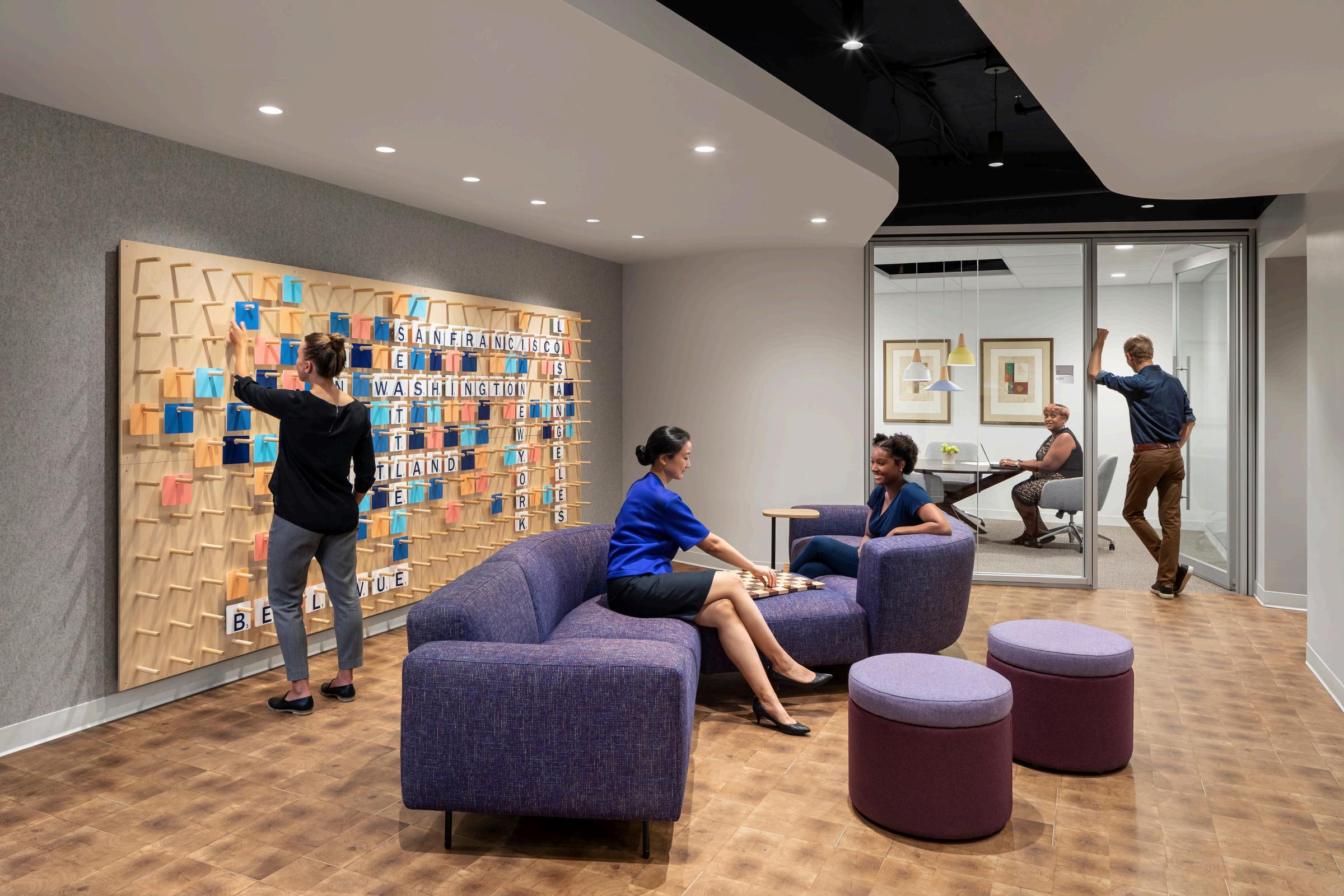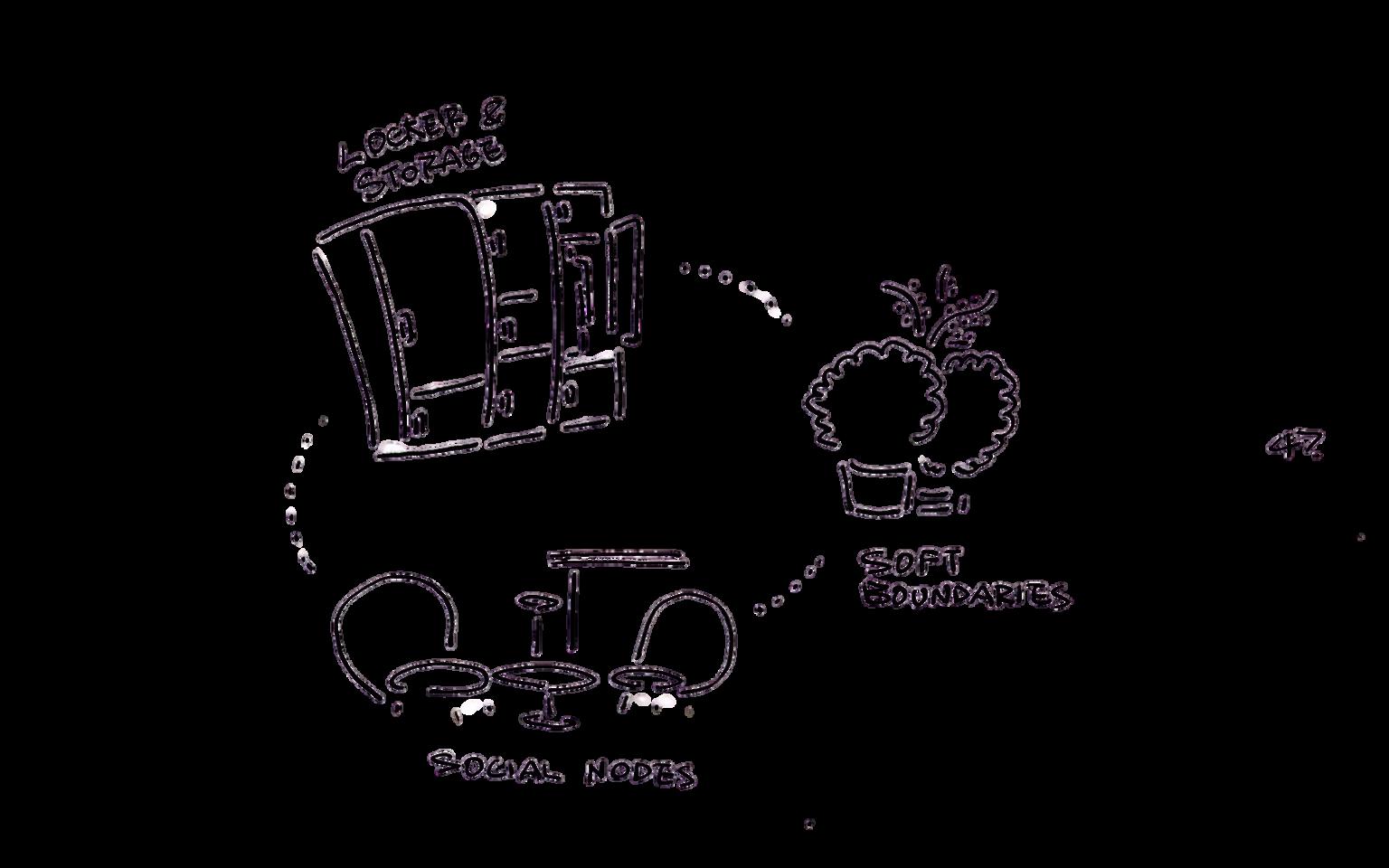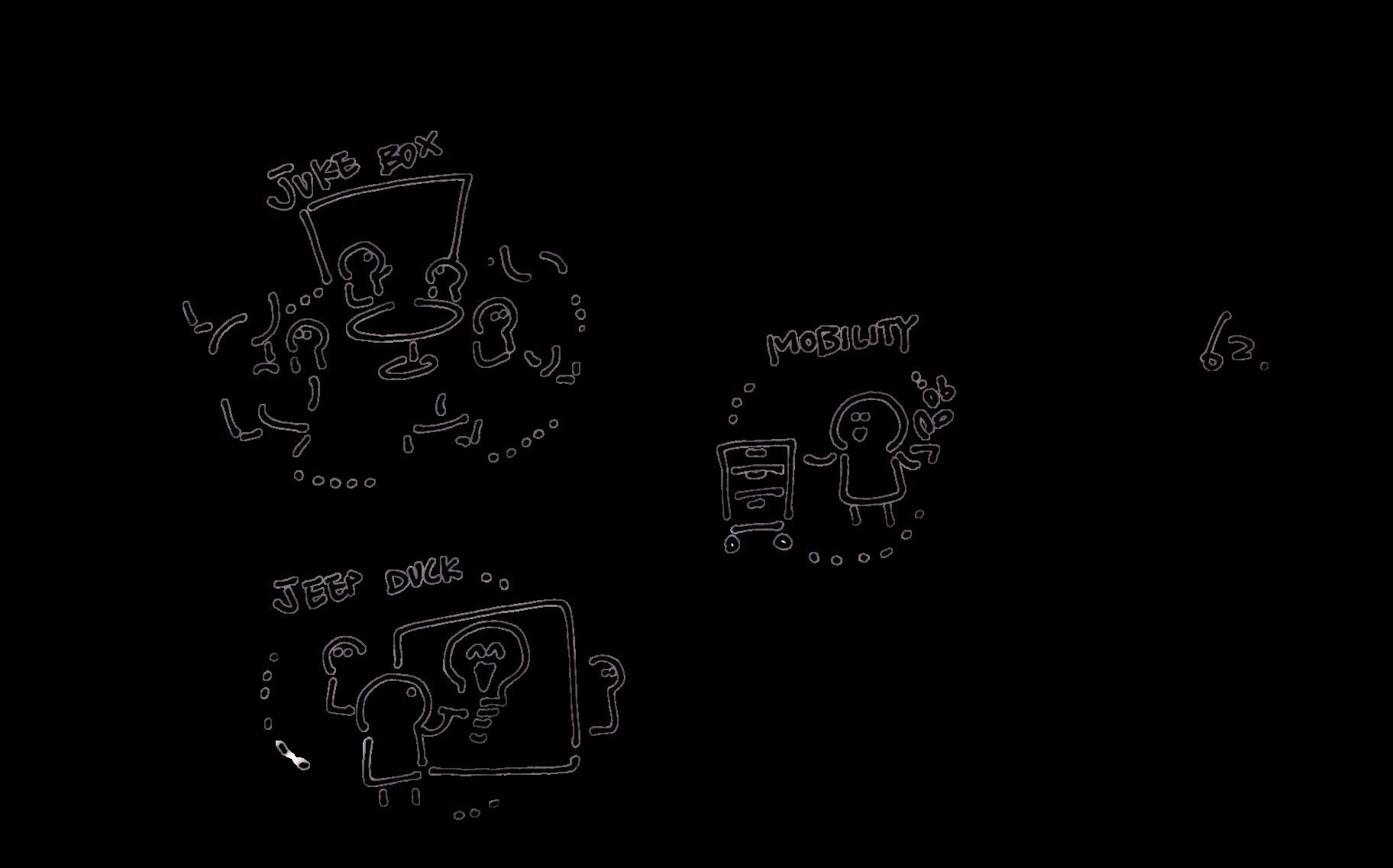






Authors: CharlotteBöhning,HannaNegami,WidyaRamadhani, KatherineGluckselig,RebeccaMilne,RobertCondia
Layout:WidyaRamadhani
Illustrations:
@sketchifyviaCanvacom:coverpage,page2
LingZhong:pages5,8(top),9(bottom),10(bottom),11(bottom),13,16-21,23
ImagineHarry@trendifyviaCanvacom:pages4,9(top) AdobeStock:pages7,8(bottom) @sparklestrokeviaCanvacom:pages10(top),11(top)
Photography:
MayaHolt@baseimageviaCanvacom:page6
Floortje@gettysignatureviaCanvacom:page6 AndrewRugge.CopyrightPerkinsEastman:pages3,12,15(topleft,bottom),16
SarahMechling.CopyrightPerkinsEastman:page15(topright)
Copyright©2025byPerkinsEastman Allrightsreserved Nopartofthispublicationmaybereproduced,storedina retrievalsystem,ortransmittedinanyformorbyanymeans,electronic,mechanical,photocopying,recording,scanning, orotherwise,exceptaspermittedunderSection107or108ofthe1976UnitedStatesCopyrightAct.
LimitofLiability/DisclaimerofWarranty:Whiletheauthorshaveusedtheirbesteffortsinpreparingthisreport,theymake norepresentationsorwarrantieswiththerespecttotheaccuracyorcompletenessofthecontentsofthisreportand specificallydisclaimanyimpliedwarrantiesofmerchantabilityorfitnessforaparticularpurpose.Nowarrantymaybe createdorextendedbysalesrepresentativesorwrittensalesmaterials Theadviceandstrategiescontainedhereinmay notbesuitableforyoursituation.Youshouldconsultwithaprofessionalwhereappropriate.Neitherthecopyrightholder northeauthorshallbeliablefordamagesarisingherefrom


When your seat isn’t yours and your space has no walls, do you still have a “home base” at the office?
Open-planseatinghaslongbeena polarizingfixtureinU.S.offices,valuedfor itsefficiencyandflexibilitywhilecriticizedfor itsnegativeimpactonemployeecomfortand well-being Therecentsurgeinunassigned andfree-addressseating(whereemployees donothaveapermanentlyassigneddesk), acceleratedbytheshifttohybridworkand thedesiretoreduceofficesquarefootage, onlyamplifiesthesechallenges.Withouta privateandpermanentworkspace, employeesmayexperienceincreasedstress, distractions,andburnout.
In 2024, only 40 percent of offices in the U.S., Canada, and Latin America had a 1:1 or lower employee-to-desk ratio, down from 56 percent in the previous year.1


Rise in free-address + open-plan models

Decline in satisfaction + loss of “home base”
How can we transform these spaces into “Someplace Like Home?”
Hominessisoneofthethreekeypsychological responsestoindoorspaces. Buildingonthis understanding,weexploredfactorsthatsupportorlimit hominessinworkplaceenvironmentsandhowfeeling athomeatworkimpactspeople’sexperiences.
Throughourworkwithorganizationsworldwide,ourteamatPerkinsEastman hasnoticedatrendamongourcorporateclientswhohavedownsizedtheir officesorareconsideringsharedseatingarrangements. Theseshiftshavemadeuswonder:

What are the barriers to hominess in free-address, open-plan environments?
This question focuses on identifying the factors limiting hominess in free-address environments.
We aim to investigate how design elements influenced by user behavior and preferences can create a sense of identity and ownership in spaces that lack permanent seating assignments

How can behaviordriven design enhance “hominess” in free-address, open-plan environments?

Feedbackfromknowledgeworkersto betterunderstandwhathominess meanstothem.
Observationtoassessworkers' activitiesandtheirrelationshipwith thespace,identifyingfactorsthat supportorhinderthefeelingof hominess.
Employeesvolunteeredtorecord theirdailyworkingexperience, highlightingspecificneeds, preferences,andpainpoints.
Tech company
Architecture firm
Co-working café
Solutionideationworkshopsandidea prioritizationwithdesignstudents.
Public library

How
Hominessisimportanttopeopleintheworkplace(86%ofrespondentsreportedit isatleastmoderatelyimportant,55%reportedthatitisveryorextremely important),withphysicalcomfortbeingthetopfactors

Oursurveyanalysisfoundthat satisfactionwithone’sworkplacewas moststronglylinkedtophysical comfort,privacy,andpersonalidentity inthespace—moresothanthetypeof seatingarrangement.
Infact,unassignedseatingina homifiedworkplacecanactuallylead tohighersatisfactionthanworking fromhome,aslongasworkersfeel reflectedintheirspace,experience comfort,andmaintainprivacy.

Whileemployeesmayhavemorefreedomofchoiceinfree-address, open-planworkenvironments,behavioralnorms,andguidelinescanlimit theirindividualexperience.Achievingabalancebetweenfreedomand limitationsrequiresunderstandingtheinherenttensionsatplay.
Employeescanchoosewhereto sitforcomfortandproductivity, butbehavioralnormsand guidelinesmaylimitpersonal expressionandautonomy.

“I prefer to work in the [areas where] I have better control of the light settings I can’t turn down the lights too low in the front retail space as that may hinder the accessibility of the space for others ” - User Experience Diary



"Working in a 'café' setting is difficult on the days we are busy There were multiple people on calls, lots of loud conversations, and it was an incredibly overstimulating atmosphere "
- User Experience Diary
Privacy
Open-planspacesaimtofoster collaboration,butthelackof physicalbarrierscandisrupt employees'abilitytofocusand handlesensitivework.
Althoughemployeescan temporarilyclaimaspaceinfreeaddressenvironments,timelimits hindertheirabilitytopersonalizeit andreflecttheiridentity.

Hominessintheworkplaceisachievedthroughtheinteractionbetweenpeople andtheirworkenvironments.Tosupportpeople’saction,theenvironmentmust haveasetofaffordancesthatenablehominess.Weidentifiedfamiliarity,trust, andasenseofownershipaskeyaffordancesthataworkplacemusthaveto achievehominess.Eachcharacteristichasaconcretespatialmanifestationthat canbeintegratedintoworkplacedesign.


Allowspeopletofeelthatthey intimatelyknowthespace Familiaritycapturesaholistic interactionbetweenthe ambiance,thevisualaesthetics, andtheritualisticbehaviorsthat peoplesee,feel,anddointheir workplace.

Eveninfree-address environments,officedesign, culture,andpolicyshouldenable employeestochoose,claim,and personalizetheirworkspace;this cultivatesasenseofattachment andenhancesoverall engagementwiththespace.


Workersshouldfeelconfidentthat theirworkspacewillmeettheir needs,includingtheirneedfor comfort,safety,andproductivity
Thisstrategycanbeachievedbyincorporatingnaturalornature-inspiredmaterials wood,stone,naturaltextiles theuseofplantsandwaterfeaturesinindoorenvironments, andcreatinganature-likesettingthroughdaylight,freshair,andviewstotheoutdoors.
Warmcolorsandlighting,softtextures,andambientmusiccancreateawarmambiance inthespace Additionally,camaraderiewithco-workerscanenhancewarmfeelingsand forgeconnections
Employsharedpersonalizationbyaddingdecorationsthatresonatewiththecommunity, showcasingprojectsandachievements,oraddingplayfulobjectsthatenhancethe characterofthespace.
Provideproximitytotools,resources,andconveniencesforemployeestotakemicrobreaks short,frequentrespites,suchaswalking,stretching,deepbreathing,andsnacking,that canhelpthemreducefatigueandimprovefocusandproductivity
Officedesignmustbeintuitive,easytonavigate,organized,clean,andhaveclear functionalitytopreventfeelinglostinthespace.
People can feel that something is theirs by virtue of being associated and familiar with it.3




Feelingsafeintheofficecanbepredicatedonphysicalattributessuchasbeingableto securelystoreone’svaluablesoremotionalattributeslikefeelingthatonebelongstothe community.Physicalsafetymightbesupportedbypersonallockers,delineatingspaces usingsubtlevisualboundaries,andstrategicallyplacingsocialnooks/nodes.Emotional safetyisfeelingsafetobeone’sauthenticselfandtoexpressthoughts,feelings,and concernswithoutfearofjudgment,ridicule,orretaliation
Reliabilityrelatestoone’sabilitytoaccessto basicneedssuchasphysicalcomfort,reliabl technology(eg,Wi-Fi,monitors,power), accesstonutrition andothertoolsand



Autonomyofchoiceariseswhenavarietyofoptions areavailable,allowingemployeestoselectbased ontheirneedsandpreferences Thisincludes diverse,accessiblespatialzonesandfurnituretypes thatprovideasenseofcontrolforemployees
Theabilitytoclaiminvolvesassertingone's presenceinaspaceforasetperiod,suchasafreeaddressoffice Claimingspacecanlooklikeleaving belongingsoradesktagtoreserveaworkstationor usingareservationsystemtosecureaspotfora specifictime
Theabilitytopersonalizeletsindividualsadjusttheir workenvironmenttoreflecttheirneedsand preferences.Withthoughtfuldesign,policies,and culture,thespacecanbetailoredtomatch employees'uniqueidentities.Toachievethis, customizablefeatureslikeoccupant-controlled lighting,temperature,noise,height-adjustable desks,andmodularcomponentscanbe easilyimplemented
The roots of psychological ownership can be found in three main motives: (1) efficacy and effectance, (2) self-identity, and (3) 'having a place.3
Ourideationworkshopseriesincludedtwo1.5-hourworkshopswithindustrial designstudentsatKansasStateUniversity.Theworkshopsexploredhow workspacesinfluencewell-beingandproductivity,aimingtoidentify opportunitiesforhomifyingworkspaces.
Participantshighlightedavarietyof factorscontributingtoworkspace discomfortintheirlivedexperience, including:physicaldiscomfort, environmentalstressors, psychologicalbarriers, andfunctionalinefficiencies.
Inresponse,participantsthen brainstormedpossiblefactorsthat mightmakeaspacefeelhomier. Thegroupenvisionedamore invitingandhomelikeoffice experiencecenteredonsensory andatmosphericenhancements, flexiblespatialdesign,and community-drivenspaces.

InpreparationforWorkshop2andthegenerativeideationitwouldentail, participantsconsideredthefollowingthought-startersandprepared sketchestosharefordiscussion.

How might we create shared sensory experiences that balance individual control with collective delight?

How can we design modular fluid spaces that sense of Pack-In,Pack-OutMobility

The“JeepDuck”Phenomenon
What if we propose a shared community object something everyone takes care of, contributes to, or interacts with over time?
BuildingonthethemesfromWorkshop1andthesketchescreatedin responsetothethought-starters,participantsfocusedonthestrongest ideasduringWorkshop2.Ourteamthenrefinedtheseintothreepotential directionsforahominesssolutionprototype:
Workyourangles:Designfordynamicposturesandcomfort
Thisthemebuildsontheideathat workspacesshouldsupportavarietyof posturesandmovementsthroughoutthe day Inspiredbythisneedforergonomic variety,participantsenvisionedadaptable seatingsolutionsthatallowusersto effortlesslyshiftbetweensitting,lounging, andrecliningpositions.
Potentialimplementationsthatwemay prototypeincludetemperature-controlled seating,modularloungeareas,andhybrid standing-sittingworkstationsthatrespond todifferentcomfortneeds
Findyourmascot:Personalizationandplayfulnessintheworkplace
Thisconcepttapsintothepoweroffamiliar andplayfulelementsthatmakeworkspaces feelmorepersonalandengaging.Inspired bytheideaofworkplacemascots(e.g.,Jeep Duck),thisideaexploreshowsymbolicor whimsicalobjectscanfosterasenseof ownershipandemotionalconnection
Possibleactivationsincludeoffice-wide collectibles,mobiledeskaccessories,and rotatingthemeddecorthatemployeescan contributetoovertime

Beahost:Cultivatingsharedatmosphereandsocialconnections
Drawingfromideaslikejukebox-inspired communalinteractions,thisthemecenters oncreatingsharedspacesthatencourage employeestobeactiveparticipantsin shapingtheirenvironment
Solutionscouldincludeinteractivemusic andlightingcontrols,curatedgathering spacesthatevolvebasedonuserinput,and smallritualslikecoffeehoursorcollaborative artwallsthatmaketheworkspacefeel dynamicandinclusive
Snapshotofourworkshopideas:

Lookingahead,ourteamwillleveragethemostsuccessfuldirectionstoprototype anddevelopintoafunctionalhominesssolution.
Weareaninterdisciplinaryteamofconsultantswithbackgroundsin architecture,industrialdesign,designresearch,environmentalpsychology, cognitiveneuroscience,andneuropsychology.Ourdiverseperspectivesshape everyaspectofourwork,allowingustobridgethegapbetweenresearchand practicetodeliverbetterhuman-centeredsolutions.

Charlotte Böhning Associate | Design Strategist & Industrial Designer

Katherine Gluckselig Associate | Design Strategist

Hanna Negami, Ph.D. Associate | Data Strategist

Rebecca Milne Associate Principal | Director of Design Strategy
Acknowledgements
Widya Ramadhani, Ph.D. Associate | Design Researcher


Robert Condia, FAIA Professor Emeritus of Architecture Kansas State University
Wewouldliketosincerelythankallresearchandworkshopparticipantsfortheir valuableinsightsandactiveengagement,whichgreatlyenrichedthefindingsof thisresearch.

Collaborate with us
Connectwithusformoreinformationortoexplore collaborationopportunities.Welookforwardtohearing fromyou!
1.CBREResearch.(2024,August).2024AmericasOfficeOccupierSentimentSurvey.CBRE, Inc https://mktgdocscbrecom/2299/f9233902-1224-4c34-881e-8e0f3f3a1db12120373946/v032024/2024-americas-office-occupier-sentiment-surveypdf
2.Coburn,A.,Vartanian,O.,Kenett,Y.N.,Nadal,M.,Hartung,F.,Hayn-Leichsenring,G., Navarrete,G.,González-Mora,J.L.,&Chatterjee,A.(2020).Psychologicalandneural responsestoarchitecturalinteriors Cortex,126,217–241 https://doiorg/101016/jcortex202001009
3.Pierce,J.L.,Kostova,T.,&Dirks,K.T.(2001).TowardaTheoryofPsychologicalOwnership inOrganizations.TheAcademyofManagementReview,26(2),298. https://doiorg/102307/259124


